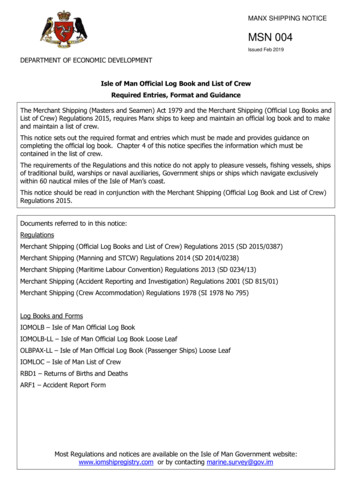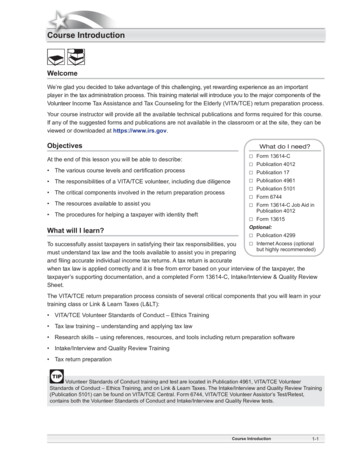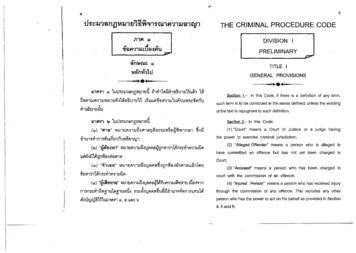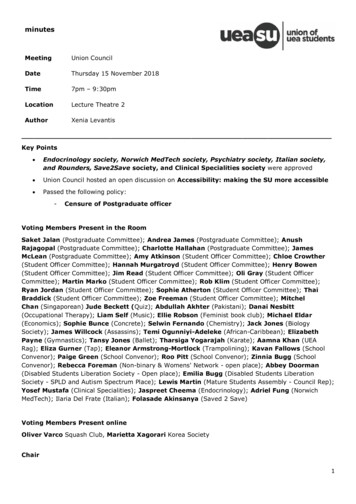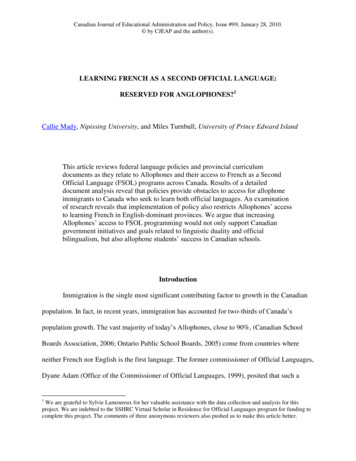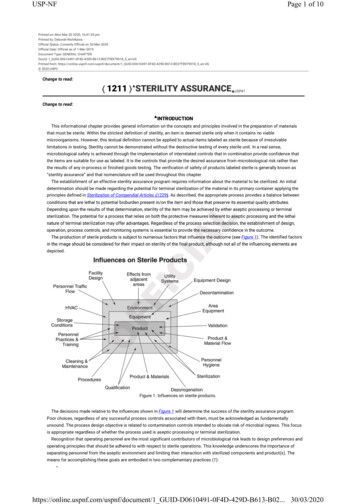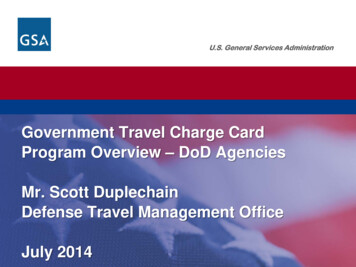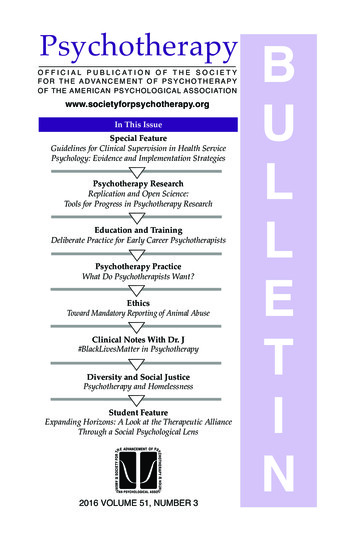
Transcription
PsychotherapyO F F I C I A L P U B L I C AT I O N O F T H E S O C I E T YF O R T H E A D VA N C E M E N T O F P S Y C H O T H E R A P YOF THE AMERICAN PSYCHOLOGICAL ASSOCIATIONwww.societyforpsychotherapy.orgIn This IssueSpecial FeatureGuidelines for Clinical Supervision in Health ServicePsychology: Evidence and Implementation StrategiesPsychotherapy ResearchReplication and Open Science:Tools for Progress in Psychotherapy ResearchEducation and TrainingDeliberate Practice for Early Career PsychotherapistsPsychotherapy PracticeWhat Do Psychotherapists Want?EthicsToward Mandatory Reporting of Animal AbuseClinical Notes With Dr. J#BlackLivesMatter in PsychotherapyDiversity and Social JusticePsychotherapy and HomelessnessStudent FeatureExpanding Horizons: A Look at the Therapeutic AllianceThrough a Social Psychological Lens2016 VOLUME 51, NUMBER 3BULLETIN
Society for the Advancement of Psychotherapy n 2016 Governance StructurePresidentArmand Cerbone, PhD3625 N Paulina StChicago, IL 60613Ofc: 773-755-0833 Fax: 773-755-0834E-mail: arcerbone@aol.comPresident-electJeffrey Zimmerman, PhD391 Highland Ave.Cheshire, CT 06410Phone: 203-271-1990333 Westchester Ave., Suite E-102White Plains, NY 10604Ofc: 914-595-4040E-mail: drz@jzphd.comSecretaryBarry Farber, PhD, 2015-2017Dept of Counslg & Clinical PsychologyColumbia University Teachers College525 W 120th StNew York, NY 10027Ofc: 212-678-3125 Fax: 212-678-8235E-mail: farber@tc.columbia.eduTreasurerJesse J. Owen, PhD, 2016-2018University of Denver, MorgridgeCollege of EducationCounseling Psychology Department1999 E Evans AveDenver CO 80208Ofc: 303-871-2482E-mail: jesse.owen@du.eduPast PresidentRodney K. Goodyear, PhDSchool of EducationUniversity of RedlandsRedlands, CA 92373-0999Ofc: 909-748-8800E-mail: rod goodyear@redlands.eduContinuing EducationTony Rousmaniere, PsyDStudent Health and Counseling CenterUniversity of Alaska, Fairbanks612 N. Chandalar Drive, PO Box 755580Fairbanks, AK 99775-5580Phone: (907) 474-7043E-mail: trousmaniere@gmail.comDiversityChair: Astrea Greig, PsyDBoston Healthcare for the Homeless Program780 Albany St, Rm 3107Boston MA 02118Ofc: 857-654-1324E-mail: agreig@bhchp.orgEarly Career PsychologistsChair: Kevin McCarthy, PhDDept. of Psychology / Chestnut Hill CollegeSt. Joseph’s Hall 4529601 Germantown AvenuePhiladelphia, PA 19118Ofc: 215 248-7115E-mail: kevin.mccarthy@chc.eduEducation & TrainingStewart Cooper, PhDCounseling Services / Valparaiso University1602 LaPorte AvenueValparaiso, IN 46383Ofc: 219-464-5002 Fax: 219-464-6865E-mail: stewart.cooper@valpo.eduELECTED BOARD MEMBERSDomain RepresentativesPublic Interest and Social JusticeRosemary Adam-Terem, PhD, 2015-20171833 Kalakaua Avenue, Suite 800Honolulu, HI 96815Ofc: 808-955-7372 Fax: 808-981-9282E-mail: drrozi@yahoo.comPsychotherapy PracticeBarbara Thompson, PhD, 2016-20183355 St. Johns Lane, Suite F.Ellicott City, MD 21042Ofc: 443-629-3761E-mail: drbarb@comcast.netEducation and TrainingJennifer Callahan, PhD, 2016-2018UNT Department of PsychologyTerrill Hall, Room 3761155 Union Circle #311280Denton, TX 76203-5017Ofc: 940-369-8229E-mail: Jennifer.Callahan@unt.eduMembershipJean Birbilis, PhD, 2016-2018University of St. Thomas1000 LaSalle Ave., MOH 217Minneapolis, Minnesota 55403Ofc: 651-962-4654 Fax: 651-962-4651E-mail: jmbirbilis@stthomas.eduEarly CareerRayna D. Markin, PhD, 2014-2016Department of Education and Counseling302 Saint Augustine Center800 Lancaster AveVillanova, PA 19075E-mail: rayna.markin@villanova.eduOfc: 610-519-3078Science and ScholarshipSusan S. Woodhouse, PhD, 2014-2016Department of Education and Human ServicesLehigh University111 Research DriveBethlehem, PA 18015Ofc: 610-758-3269 Fax: 610-758-3227E-mail: woodhouse@lehigh.eduSTANDING COMMITTEESFellowsChair: Robert L. Hatcher, PhDWellness Center / Graduate CenterCity University of New York365 Fifth AvenueNew York, NY 10016Ofc: 212-817-7029E-mail: rhatcher@gc.cuny.eduFinanceChair: Arnold Holzman, PhDBehavioral Health Consultants3018 Dixwell AvenueHamden, CT 06518Ofc: 203-288-3554 x12 Fax: 203-281-0235E-mail: adholzman@bhcservices.comMembershipAnn Judge, PhD49 Old Solomon’s Island Road, Suite 200Annapolis, MD 21401(410) 266-8555 (answering service)E-mail: Anniejudge@aol.comNominations and ElectionsChair: Jeffrey Zimmerman, PhDE-mail: drz@jzphd.comProfessional AwardsChair: Rodney K. Goodyear, PhDE-mail: rod goodyear@redlands.eduDiversityJairo Fuertes, PhD, 2014-2016Derner Inst. of Advanced Psychological StudiesAdelphi University Hy Weinberg Ctr Rm 319158 Cambridge Ave.Garden City, NY 11530Ofc: 516-877-4829E-mail: jfuertes@adelphi.eduDiversityBeverly Greene, PhD, 2016-2018Psychology, St. Johns University8000 Utopia Pkwy.Jamaica, NY 11439Ofc:718-638-6451E-mail: bgreene203@aol.comInternational AffairsFrederick Leong, Ph.D. (2016-2017)Michigan State UniversityDepartment of PsychologyEast Lansing, MI 48824Phone: 517-353-9925; Fax: 517-353-1652E-mail: fleong@msu.eduAPA Council RepresentativesJohn C. Norcross, PhD, 2014-2016Dept of PsychologyUniversity of ScrantonScranton, PA 18510-4596Ofc: 570-941-7638 Fax: 570-941-2463E-mail: norcross@scranton.eduJean Carter, PhD, 2014-2016Washington Psychological Ctr PC5225 Wisconsin Ave NW #513Washington, DC 20015Phone: 202-244-3505 x3 Fax: 202-364-0561E-mail: JCarterPhd@gmail.comStudent Development ChairMaria Lauer, 2015-2016101 Race St. Apt 111Catasauqua, PA 18032Phone: 302-743-2578E-mail: marialauer2@gmail.comProgramChair: Changming Duan, PhDDept. of Psychology & Research in EducationUniversity of KansasLawrence, KS 66054Ofc:785 864-2426 Fax 785 864-3820E-mail: duanc@ku.eduPsychotherapy PracticeChair: Barbara Vivino, PhD921 The Alameda #109Berkeley, CA 94707Ofc: 510-303-6650E-mail: bvivino@aol.comPsychotherapy ResearchChair: Joshua Swift, PhDDepartment of PsychologyUniversity of Alaska Anchorage3211 Providence Drive, SSB214Anchorage, Alaska 99508Phone: 907-786-1726E-mail: jkswift@alaska.eduSocial JusticeChair: Hiroshi M. Sasaki, PhDPsychology Dept. / University of the West1409 N. Walnut Grove Ave.Rosemead, CA 91770Phone: 562-756-6211E-mail: hiroshis@uwest.edu
PSYCHOTHERAPY BULLETINPublished by theSOCIETY FORTHE ADVANCEmENTOF PSYCHOTHERAPYAmerican Psychological Association6557 E. RiverdaleMesa, AZ 85215602-363-9211e-mail: assnmgmt1@cox.netEDITORLynett Henderson Metzger, Psy.D.Lynett.HendersonMetzger@du.eduASSOCIATE EDITORIan Goncher, Ph.D.idgoncher@loyola.eduCONTRIBUTING EDITORSDiversityBeverly Greene, Ph.D., andJairo Fuertes, Ph.D.PSYCHOTHERAPY BULLETINOfficial Publication of the Society for the Advancement ofPsychotherapy of the American Psychological Association2016 Volume 51, Number 3CONTENTSPresident’s Column .2A New International PartnershipEditors’ Column .5Special Feature .6Guidelines for Clinical Supervision in Health ServicePsychology: Evidence and Implementation StrategiesEducation and TrainingJesse J. Owen, Ph.D., andJennifer Callahan, Ph.D.Psychotherapy Research .19Replication and Open Science:Tools for Progress in Psychotherapy ResearchEthics in PsychotherapyJennifer A.E. Cornish, Ph.D.Education and Training .25Deliberate Practice for Early Career PsychotherapistsPsychotherapy PracticeBarbara Thompson, Ph.D., andBarbara Vivino, Ph.D.Psychotherapy PracticeWhat Do Psychotherapists Want? .30Psychotherapy Research,Science and ScholarshipSusan Woodhouse, Ph.D., andJoshua Swift, Ph.D.Meditation and the Mindfulness Trend in .34Psychotherapy: Reflections Through thePrism of a 50-Year MeditatorPublic Policy and Social JusticeArmand Cerbone, Ph.D., andRosemary Adam-Terem, Ph.D.International Affairs .44International Affairs UpdateWashington ScenePatrick DeLeon, Ph.D.Ethics .46Toward Mandatory Reporting of Animal AbuseEarly CareerRayna Markin, Ph.D., andKevin McCarthy, Ph.D.Clinical Notes With Dr. J .49#BlackLivesMatter in PsychotherapyStudent FeaturesMaria LauerEditorial AssistantsKrystine Jackson, M.A.Elizabeth Coyle, MA, LPCSTAFFCentral Office AdministratorTracey ity and Social Justice .53Psychotherapy and HomelessnessStudent Feature .55Expanding Horizons: A Look at the TherapeuticAlliance Through a Social Psychological LensWashington Scene .58Fly Down the HighwayReferences .681
PRESIDENT’S COLUmNA New International PartnershipArmand R. Cerbone, PhD, ABPPChicago, ILBy far the most significantand far-reaching achievement since I wrote threemonths ago has been thepact made between Oriental Insight (OI) and ourSociety for the Advancement of Psychotherapy (SAP). OI is an organization of Chinese psychologists whowish to partner with us for mutual benefit. The partnership aims: To increase exchange between SAPand OI as organizations that promote psychotherapy in the UnitedStates and in China; To facilitate dissemination and enrichment of psychotherapy researchacross language and national boundaries in the United States and China; To promote collaborations in research and training among SAPmembers and Chinese researchersand practitioners in the field ofcounseling and psychotherapy inChina; To facilitate the recruitment in Chinaof SAP non-APA affiliate membersand APA affiliates who might wantto join SAP, and to enable SAP toprovide them some of the memberresources afforded by having translated materials.2The agreement was formally signedduring the APA annual convention inDenver in August (see photo, p. 3). Dr.Guangrong Jiang, founder of OI, whowas accompanied by a colleague, Dr.Chin, signed for OI and I signed as President for SAP. Perhaps the significancefor SAP and APA’s international agendacan best be conveyed by the list of dis-tinguished APA dignitaries who spokeat the signing: APA Past-President Dr.Barry Anton; Dr. Jean Lau Chin, President of Division 52 (International Psychology); and Dr. Merry Bullock, Directorof the APA Office for International Affairs. Former APA President Dr. Phil Zimbardo also attended. SAP Past-PresidentDr. Rod Goodyear moderated the ceremony. Before the signing, both Drs. Jiangand Chin addressed the attendees aboutthe mission and work of OI and theirhopes for our collaborations.Dr. Changming Duan, Chair of our newInternational Committee and Past-President Goodyear spearheaded the initiative over several years, establishingrelationships with our Chinese colleagues and educating our Board of Directors to the importance of thispartnership to SAP. Dr. Fred Leong, ournew Representative of the Domain forInternational Affairs, also provided critical leadership in developing the relationships (and has written in this issue’sInternational Affairs Column regardingthe partnership agreement and upcoming plans for the Domain). We are grateful to them for bringing this to fruition.ConventionI am pleased to tell you that our convention program was a solid success.The Society’s theme, the intersections ofscience, sexuality, and psychotherapy,afforded many opportunities for the scientists and practitioners among us tooffer evidence-based and skill-buildingsymposia. Other presentations spanneda range of topics including publishing,supervision, diversity, theory, and evencontinued on page 3
Photo courtesy of Chun-Chung (Chung)a session on comedy as a basis for difficult dialogues. Ten of the programs carried a total of 13 CE credits. Feedbackfrom presenters indicates our programswere well attended and positively received.Anyone who has ever volunteered to beProgram Chair understands the monthsof untold hours spent collaborating, reviewing, and negotiating with other divisions, the Convention Office, and withthe current division president from thefirst call for programs to final approvalof a convention program. The task is arduous and complicated in the extreme.We owe our Program Chair, Dr. Duan,and her Associate Chair, Dr. Gary Howell, our respectful and appreciativethanks. Gary will continue as the 2017and 2108 Program Chair. President-electJeff Zimmerman is already busy planning the theme for next year’s programin Washington, DC.mote the development of psychotherapies that integrate theoreticalorientations, clinical practices, anddiverse methods of inquiry.” SAPhas a longstanding relationshipwith SEPI; former SAP PresidentDr. Marvin Goldfried is one itsfounders. At this conference SAPsponsored the Continuing Education credit program. [Editor’sNote: Next year’s SEPI conferencewill be in Denver, Colorado. Pleaseconsider joining us.]In July 2017, leading SAP researchersand Board members will attend andpresent at the 8th World Congress onPsychotherapy in Paris. The theme isLife and Love in the 21st Century.In development is a conference on psychotherapy training and supervisionwith Oriental Insight in Wuhan, China,in or around April 2017.Getting to Know Your Board membersI thought you might be interested inknowing the Editor of our lead journal,Psychotherapy, mark Hilsenroth, PhD,ABPP, and the Editor of our quarterlynewsletter, Psychotherapy Bulletin, LynettHenderson metzger, PsyD, JD.As Editor, Mark is a key member of ourPublications Board, chaired by formerDivision 29 President Jeff Barnett. Priorto assuming the editorship of Psychotherapy,Mark served on the editorialmore on the International FrontboardsofPsychotherapyResearch, JournalIn June several of our Board membersattended the 32nd annual conference of Personality Assessment, and the Journalof the Society for the Exploration of of the American Psychoanalytic Association.Psychotherapy Integration (SEPI) inDublin, Ireland. Dr. John Norcross, one Mark graduated from the University ofof our representatives to the APA Coun- Tennessee’s Clinical Psychology PhDcil of Representatives, presented on program in 1996 and completed hiscommon factors in psychotherapy. For Clinical Internship at The Cambridgethose of you unfamiliar with it, SEPI is Hospital/Harvard Medical School.an organization that brings psychother- When not editing the journal, Mark is aapists and researchers together “to procontinued on page 43
Professor of Psychology at the DernerInstitute of Advanced PsychologicalStudies at Adelphi University. There heserves as Primary Investigator of theAdelphi University Psychotherapy Project. His research interests are primarilyfocused on applied clinical issues, withover 150 peer-reviewed journal publications in the areas of psychological assessment & psychotherapy.Lynett Henderson metzger, JD, PsyD,earned her Juris Doctor from theUniversity of Denver’s Sturm Collegeof Law in 1997 and her Doctorate inClinical Psychology from DU’s Graduate School of Professional Psychology in2003, where she is currently a ClinicalAssociate Professor and Assistant Director of Forensic Studies. She draws on herbackground in law and mental health toteach a variety of courses in the Forensic Psychology, International DisasterPsychology, and Clinical Psychologyprograms. Her areas of interest includeprofessional education and training,diversity and social justice, and victimadvocacy.treasurer. She will assume the office inJanuary 2017.Jean has provided strong and significantleadership in SAP. As President of ourDivision, she led the drive to add seatsto the Board to create more opportunities for members to participate in governance. During her presidency wechanged the structure of the Board frommember-at-large seats to domains thatexpand opportunities to promote themission of the Division. It goes withoutsaying that we will miss her presence,though we know she will take to theAPA Board of Directors the same commitment to advancing psychotherapythat so informed her years with us.We will be welcoming back to the Boardformer President Libby Nutt Williamswho will step into Jean’s position asCouncil Representative for the remainder of Dr. Carter’s term.Finally, Dr. Stewart Cooper, currentChair of the Education & Training Committee, has been elected to the APABoard of Directors. He, too, will be leavTogether Lynett and Mark are keeping ing us to assume his new responsibilitiesour premier publications relevant and in January.the scholarship in them outstanding andmake them a major benefit of member- We are fortunate to have working for usship in the Society. They deserve our capable and dedicated professionalswho give so much and so competentlycontinuing support and thanks.to SAP over the years. And we remaincommitted to fostering new leadershipA Final AnnouncementDr. Jean Carter, one of our two Council equally capable of leading us into theRepresentatives has been elected APA next decades.4
EDITORS’ COLUmNLynett Henderson Metzger, PsyD, JDUniversity of Denver-Graduate School of Professional PsychologyIan Goncher, PsyDPediatric Care SpecialistsDivision of Behavioral Health ServicesJohnstown, PAAs summer winds to aclose, we look back onthe past few months asexciting and busy onesfor the Society for theAdvancement of Psychotherapy (SAP) aswhole, as well as personally for many ofour members. It waswonderful to see somany of you at theAPA Convention inDenver, and we hopethat those of you who were able to attend have fond memories of the eventand one another (and please take a lookat the photos in the back of this issue).Also in this issue of Psychotherapy Bulletin, Dr. Armand Cerbone reflects on theConvention in his President’s Column,as do Drs. Fred Leong and ChangmingDuan in their International Affairs Update. Our Special Feature, “Guidelinesfor Clinical Supervision in Health Service Psychology: Evidence and Implementation Strategies,” is sure to be ofinterest, as will articles on replication inpsychotherapy research, “mindfulness”in psychotherapy, a student piece onlooking at the therapeutic alliancethrough a social psychology framework,and many others. Our Early Careerreaders will definitely want to readthe Education and Training selection,“Deliberate Practice for Early CareerPsychotherapists,” and members willfind the 2017 Nominations Ballot in thisissue, along with other information related to important SAP business matters. As always, we invite everyone tovisit the Society’s website(http://societyforpsychotherapy.org/)for this issue’s web-exclusive content.Finally, along with the changing of theseason come changes to the Bulletin. TheEditors would like to thank Lisa WallnerSamstag, PhD, for her extraordinarywork assisting with book reviews for theBulletin, and welcome our new BookReview Editor, Tiffany Garner, PsyD.Our next deadline is November 1, 2016,and we would love to hear from youwith feedback or ideas for articles orwebsite content. You can find the Bulletin submission guidelines in the backof this volume or online.Have a terrific autumn!Lynett Henderson Metzger, JD, PsyDPsychotherapy Bulletin Editoremail:Lynett.HendersonMetzger@du.eduoffice: (303) 871-4684Ian Goncher, PsyDPsychotherapy Bulletin Associate Editoremail: idgoncher@loyola.eduoffice: (814) 244-44865
SPECIAL FEATUREGuidelines for Clinical Supervision inHealth Service Psychology:Evidence and Implementation StrategiesCarol A. Falender, PhDPepperdine University, Los AngelesCatherine Grus, PhDAmerican Psychological AssociationStephen McCutcheon, PhDVeterans Affairs Puget Sound Healthcare System, SeattleRodney K. Goodyear, PhDUniversity of RedlandsMichael V. Ellis, PhDDepartment of Educational and Counseling Psychology,University at AlbanyBeth Doll, PhDUniversity of Nebraska, LincolnMarie Miville, PhDTeachers College, Columbia UniversityCeliane Rey-Casserly, PhD, ABPPBoston Children’s HospitalNadine J. Kaslow, PhD, ABPPEmory University School of Medicine6Counseling psychology has demonstrated a long-standing interest and respect for clinical supervision as a uniquedomain that warrants its own preparation for practice. Counseling psychologists have distinguished themselves inthe supervision literature (e.g., Borderset al., 1991; Goodyear et al., 2000), andcounseling psychology programs havebeen much more likely than clinical andschool psychology programs to offer supervision coursework (Crook-Lyon,Presnell, Silva, Suyama, & Stickney,2011; Romans, Boswell, Carlozzi & Ferguson, 1995). But other health servicepsychology specialties now have begunto embrace the notion that supervisionrequires specific preparation. This hasbeen reflected in—and further encouraged by—several important developments in the field. Among these havebeen (a) the 1996 adoption of the accreditation Guidelines and Principles(American Psychological Association[APA], 1996) that required training programs to provide students and internswith at least some training in supervision, (b) the identification of supervisionas one of the eight core competency domains (Kaslow et al., 2004) and then (c)an expert panel’s articulation of supercontinued on page 7
vision competencies (Falender et al.,2004). Perhaps as a result of thisgrowing attention to the quality of supervision, we now have increasing documentation of the alarming extent towhich supervisees in training programsand practice settings report supervisionis either inadequate or harmful (e.g.,Ellis et al., 2014).Supervision guidelines spelling out bestpractices and expected competencies arean important means by which the fieldcan increase the quality of supervisionpractice. As a result, counseling psychology developed best practices (Borders et al., 2014) and other disciplines(e.g., National Association of SocialWorkers and Association of Social WorkBoards, 2013; National Association ofSchool Psychologists, 2011) have developed guidelines, as have psychologistsin other countries (e.g., New ZealandPsychology Board, 2010; PsychologyBoard of Australia, 2013). APA’s Boardof Educational Affairs, in recognizingthat need, convened a task group to develop supervision guidelines that APAthen adopted in 2014 (see APA, 2014,2015). This paper provides an importantsupplement to those guidelines. It addresses the conceptual and empiricalgrounding for those guidelines, then reviews the guidelines and makes suggestions based on the empirical literaturefor ways psychologists can use them toimprove supervisory practice. In support of that latter purpose, we present achecklist for psychologists to use to selfassess their supervision competencies.Germek, & Cornish, 2015; Rings,Genuchi, Hall, Angelo, & Cornish, 2009).This finding suggests that policies requiring formal training of psychologists whosupervise result not only in better-prepared supervisors, but also may increasethe value attached to training and endorsement of the importance of that training.Unfortunately, although APA accrediteddoctoral and internship programs havebeen required to provide supervisiontraining, the extent and quality of thattraining has remained variable. Lyon,Heppler, Leavitt and Fisher (2008), for example, found that only 39% of interns(26% of clinical and 73% of counselingpsychology interns) reported havingcompleted a graduate course in supervision. Forty-four percent of these respondents reported having supervised atrainee during their internship, generallyat counseling centers, but only half ofthose had completed a graduate coursein supervision. In a related study (CrookLyon et al., 2011), counseling psychologytrainees also reported having receivedmore supervision training than clinicalpsychology trainees. Even so, traineesjudged the major influence on supervision practice to have been the personalexperience of having been supervised.Evidence to support the importance ofdeliberately preparing competent supervisors has been mounting. Ellis andcolleagues (2014) identified supervisionthat was either inadequate (e.g., failureto meet minimum standards foradequate supervision), or, worse, emotionally or physically harmful to the suConceptual and Empirical Basispervisee(e.g., pathologizing trainees,for the GuidelinesPerhaps understandably, psychologists’ physically threatening trainees, or makattitudes about the value of supervision ing sexual overtures to trainees). Acrosstraining have been influenced by their two studies with large samples, Ellis andown experiences. For example, those who colleagues (2014; Ellis, Creaner, Huthave received clinical supervision train- man, & Timulak, 2015) found that 35%ing are more likely to affirm the impor- and 25% of supervisees, respectively,tance of that training (Genuchi, Rings,continued on page 87
Supervision of Health Service Psychologistswere approved by the APA as policy(APA, 2014) and were published in theAmerican Psychologist (APA, 2015). Theseguidelines are distinctive in their use ofa competency-based approach, ratherthan a particular (psychotherapy) theoretical approach, and in their applicability to a wide range of training andsupervision of health service psycholoOther evidence for inadequate or harm- gists (e.g., psychotherapy, assessment,ful supervision can be found in studies and consultation services).describing supervision that was multiculturally insensitive (e.g., Burkard, The guidelines defined competencyKnox, Hess, & Schultz, 2009; Singh & based supervision as “a meta-theoreticalChun, 2010), lacked systematic assess- approach that explicitly identifies thement (Swift et al., 2014), discounted the knowledge, skills and attitudes thatsupervisory relationship (Ladany, 2014), comprise clinical competencies, informsor modeled unethical behavior (January, learning strategies and evaluation proMeyerson, Reddy, Docherty, & Klonoff, cedures, and meets criterion-referenced2014). The risk of harm is magnified by competence standards consistent withthe supervisor’s power to evaluate and evidence-based practices (regulations),serve as a gatekeeper for the profession. and the local/cultural clinical settingIn fact, supervisor difficulties perform- (adapted from Falender & Shafranske,ing evaluations and gatekeeping func- 2007)” (APA, 2014, p. 5). The guidelinestions (Ladany, 2014; Forrest et al., 2013) are predicated on a number of assumplent urgency within the field to define tions about supervision, listed in Table 1guidelines for supervisors in health below. The stated objective was that theservice psychology.guidelines would enhance the quality ofwere currently receiving emotionally orphysically harmful supervision. Remarkably, 93% of the participants in onestudy and 75% of the participants in theother reported currently receiving inadequate supervision, including supervisors’ failure to monitor the supervisee’sclinical work (potentially affecting clientwelfare) or to use a supervision contract.8In 2002, the Competency Conferenceidentified supervision as a distinct professional competency for counseling,clinical, and school psychologists(Kaslow et al., 2004). Subsequently, aworkgroup of supervision experts fromcounseling and clinical psychology provided a preliminary structure of competencies that supervisors should achieve,prior to commencement of supervision(Falender et al., 2004). In 2012, the American Psychological Association’s Boardof Educational Affairs authorized theformation of a task force, with membersfrom clinical, counseling, and schoolpsychology, charged with writing guidelines for clinical supervision. The workwas informed by counseling psychologyand international guidelines (APA,2015). In 2014, the Guidelines for Clinicalsupervision provided by psychologists,promote the development of superviseecompetence, and assure regulators thathigh quality supervision is valued andprovided.The guidelines address seven domains:supervisor competence; diversity; thesupervisory relationship; professionalism; assessment/evaluation/feedback;problems of professional competence;and ethical, legal, and regulatory considerations. This paper provides thebridge to implementation: empiricalsupport and implementation strategiesthat will assist trainers and practitionersto apply the APA guidelines in clinicalsettings. Organized by domain (APA,2015), the paper provides a brief sumcontinued on page 9
continued on page 109
mary of empirical support for each, andrecommendations for implementation. Italso introduces a supervisor self-assessment (Appendix, below) that was developed from the guidelines, focused onsupervisors’ knowledge, skills, and attitudes. The self-assessment was designedto provide a structure for individualsand programs to assess and design appropriate training strategies, identifyareas of supervision strength that couldbe built upon, and provide a window onmetacompetence (referring here toadopting a reflective approach to whatone knows and what one does notknow—a difficult task and one that is essential to model to supervisees) (Falender & Shafranske, 2007).The Supervision GuidelinesDomain A. Supervisor Competence Supervisors seek to attain and maintain competence in the practice ofsupervision through formal education and training. Supervisors endeavor to coordinatewith other professionals responsiblefor the supervisee’s education andtraining to ensure communicationand coordination of goals andexpectations. Supervisors strive for diversity competence across populations and settings (as defined in APA, 2003). Supervisors using technology in supervision (including distance supervision), or when supervising carethat incorporates technology, striveto be competent regarding its use.10Empirical support. Empirical studies(Callahan, Almstrong, Swift, Borja, &Heath, 2009; Wrape, Callahan, Ruggero,& Watkins, 2015) have supported theimpact of supervisor competence on supervisees and client
Adelphi University Hy Weinberg Ctr Rm 319 158 Cambridge Ave. Garden City, NY 11530 Ofc: 516-877-4829 E-mail: jfuertes@adelphi.edu . Chair: Joshua Swift, PhD Department of Psychology University of Alaska Anchorage 3211 Providence Drive, SSB214 Anchorage, Alaska 99508 Phone: 907-786-1726 E-mail: jkswift@alaska.edu Social Justice



